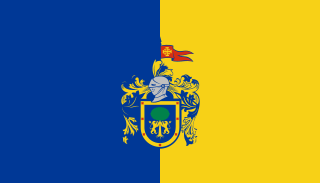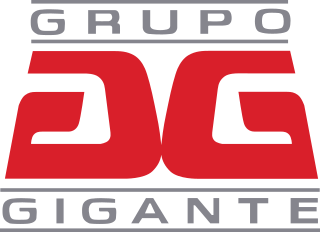
Osco Drug and Sav-on Drugs were the names of a pair of chain pharmacies that operated in the United States. Osco Drug was founded by the Skaggs family. Alpha Beta grocery store was purchased by American Stores in 1961. Skaggs Drug Centers bought American Stores in 1979 and assumed the American Stores name. Sav-on Drugs was a California-based pharmacy chain that was acquired by Osco's parent company in 1980. Both Osco and Sav-on stores eventually came under the ownership of American Stores, then Albertsons, and finally SuperValu before the stores were sold off.

Guadalajara is a city in western Mexico and the capital of the state of Jalisco. According to the 2020 census, the city has a population of 1,385,629 people, making it the 8th most populous city in Mexico, while the Guadalajara metropolitan area has a population of 5,268,642 people, making it the third-largest metropolitan area in the country and the twenty-second largest metropolitan area in the Americas. Guadalajara has the second-highest population density in Mexico, with over 10,361 people per square kilometer. Within Mexico, Guadalajara is a center of business, arts and culture, technology and tourism; as well as the economic center of the Bajío region. It usually ranks among the 100 most productive and globally competitive cities in the world. It is home to numerous landmarks, including Guadalajara Cathedral, the Teatro Degollado, the Templo Expiatorio, the UNESCO World Heritage site Hospicio Cabañas, and the San Juan de Dios Market—the largest indoor market in Latin America.

The University of Guadalajara is a public research university located in the Mexican city of Guadalajara. It was created in 1586, and officially founded on February 12, 1791. It was established as the Royal and Pontifical University of Guadalajara, and it has evolved significantly since then, becoming a major educational institution in Mexico. The university has several high schools as well as graduate and undergraduate campuses, which are distributed all over the state of Jalisco. It is regarded as the most significant university in the state. Chronologically, based on its foundation, it is the second oldest university in Mexico, the seventeenth oldest in North America and the fourteenth oldest in Latin America.
Organización Soriana is a Mexican public company and a major retailer in Mexico with more than 824 stores. Soriana is a grocery and department store retail chain headquartered in Monterrey, Nuevo Leon, Mexico. The company is 100% capitalized in Mexico and has been publicly traded on the Mexican stock exchange, since 1987 under the symbol: "Soriana".

Tonalá is a city and municipality within the Guadalajara Metropolitan Area in the state of Jalisco in Mexico. With a population of 442,440, it is the fourth largest city in the state, the other three being the other major population centres in the metro area: Guadalajara, Zapopan, and Tlaquepaque. It is best known as a major handcrafts center for Jalisco, especially pottery, as well as its very large Thursday and Sunday street market, dedicated to handcrafts.

Farmacias Benavides S.A. de C.V. is a Mexican drugstore chain.

O’Reilly Automotive, Inc., doing business as O’Reilly Auto Parts, is an American auto parts retailer that provides automotive aftermarket parts, tools, supplies, equipment, and accessories to professional service providers and do-it-yourself customers. Founded in 1957 by the O’Reilly family, the company operates more than 6,000 stores in 48 states, Puerto Rico and Mexico.

Farmacias El Amal, was a regional pharmacy chain operating throughout Puerto Rico. At its peak, it operated more than 60 pharmacies across Puerto Rico. The chain was privately held and was founded in 1973. Its largest competitors were Walgreens, Kmart and Walmart.

Jalisco, officially the Free and Sovereign State of Jalisco, is one of the 31 states which, along with Mexico City, comprise the 32 Federal Entities of Mexico. It is located in western Mexico and is bordered by six states, Nayarit, Zacatecas, Aguascalientes, Guanajuato, Michoacán, and Colima. Jalisco is divided into 125 municipalities, and its capital and largest city is Guadalajara.

China Nepstar Chain Drugstore Ltd., which conducts business as China Nepstar, is China's largest retail drugstore chain, based on the number of directly operated stores. It is headquartered in Nanshan District, Shenzhen.

Grupo Gigante is a holding listed at Mexican Stock Exchange founded in 1962, enterprises includes: Office Depot, The Home Store, SuperPrecio and Toks. The namesake hypermarkets and supermarkets are sold in 2008 to Soriana. Until December 2008, used to work with a joint venture with RadioShack.

Ameca is a city and municipality, in Jalisco in central-western Mexico. The municipality covers an area of 839.1 km². The city is bisected by the Ameca River which drains to the Pacific Ocean near Puerto Vallarta. It is located approximately 83 km from the state capital and one of Mexico's largest commercial centers, Guadalajara.
Since the foundation of the New Kingdom of Galicia, the Mexican state of Jalisco has established itself as a main hub in the national economy and as the business centre of the western portion of the country. Although its economic strength is mainly concentrated in the capital, Guadalajara, the rest of the state enjoys a growing prosperity in diverse economic areas. Forest products are obtained along the coast, and mining for silver, gold, mercury, copper, and precious stones is an important activity. The beverage tequila, distilled from the juice of the agave cactus, is named for the town of that name in Jalisco and is one of the state’s best-known products. Since the state is home to two UNESCO World Heritage Sites, tourism is an important economic engine. In 2006 20 million local and international tourists visited the state, contributing to an economic revenue of 25 billion pesos, 11% higher than in 2005. Guadalajara is served by one of the country’s busiest airports and is one of the state’s major tourist centres. Puerto Vallarta is a popular tourist destination among young students. The state ranks number three in terms of nominal GDP behind Nuevo León State. Since the adoption of the North American Free Trade Agreement (NAFTA) in 1994 the state has been experiencing a high rate of investment. Jalisco, like many other industrial states in the country, has evolved from a producer of cheap, low-quality goods into an exporter of sophisticated products, from auto brake systems to laptop computers. 86% of the population is urban, higher than the national average of 76%.

La Nueva Viga Market is the largest seafood market in Mexico and the second largest in the world after the Toyosu Market in Japan. It is located in Mexico City far inland from the coast, because of historical patterns of commerce in the country. The market handles 1,500 tons of seafood daily, representing about 60% of the total market. Most of the seafood is distributed to the Mexico City metropolitan area and the states surrounding it, but there is distribution to other states and abroad.

Traditional fixed markets in Mexico are multiple-vendor markets permanently housed in a fixed location. They go by a variety of names such as "mercados públicos", "mercados municipales" or even more often simply "mercados" (markets). These markets are distinct from others in that they are almost always housed in buildings owned and operated by the local government, with numerous stands inside rented by individual merchants, who usually sell, produce and other basic food staples. This market developed in Mexico as a way to regulate pre-Hispanic markets called tianguis. These tianguis markets remain in Mexico, with the most traditional held on certain days, put up and taken down the same day, much the way it was done in Mesoamerica.

Ceramics of Jalisco, Mexico has a history that extends far back in the pre Hispanic period, but modern production is the result of techniques introduced by the Spanish during the colonial period and the introduction of high-fire production in the 1950s and 1960s by Jorge Wilmot and Ken Edwards. Today various types of traditional ceramics such as bruñido, canelo and petatillo are still made, along with high fire types like stoneware, with traditional and nontraditional decorative motifs. The two main ceramics centers are Tlaquepaque and Tonalá, with a wide variety of products such as cookware, plates, bowls, piggy banks and many types of figures.
Walgreens Boots Alliance, Inc. (WBA) is an American multinational holding company headquartered in Deerfield, Illinois, which owns the retail pharmacy chains Walgreens in the United States and Boots in the United Kingdom, as well as several pharmaceutical manufacturing and distribution companies.

RD Saúde is the largest drugstore company in Latin America by revenue and market capitalization. With its headquarters in São Paulo, it has more than 3,000 pharmacies in Brazil with a national presence in all 27 states.
Fomento Económico Mexicano, S.A.B. de C.V., doing business as FEMSA, is a Mexican multinational beverage and retail company headquartered in Monterrey, Mexico. It operates the largest independent Coca-Cola bottling group in the world and the largest convenience store chain in Mexico. It is also a shareholder of Heineken N.V.

Héctor Villa Osorio Manizales, was a Colombian businessman and the founder of the pharmaceutical conglomerate, Dromayor. He was also the founder of Club del Comercio in Pereira and a strategic partner in construction projects such as Torre Central, Uniplex, and Unicentro Pereira. Net worth USD 300 Million.
















